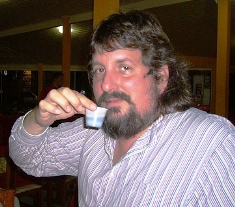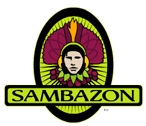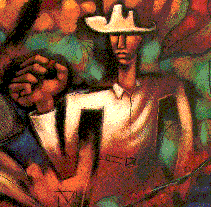
|
Equal
Exchange is a
worker-owned cooperative dedicated to Fair Trade
with grower-owned,
small-scale cooperatives in the developing world,
mostly in Latin
America. Equal Exchange was among the first to bring
the Fair Trade
movement to the U.S. coffee trade, and has been a
leader in expanding
the movement. Before Fair Trade coffee was widely
available in
stores, Equal Exchange was making it available
through churches,
synagogues, and other channels. This allowed the
company to grow
rapidly, so that it is now a substantial importer
and roaster.
Equal Exchange continues to be a source not only of
coffee, but of
information about coffee cooperatives. I am very
fortunate that EE is
located near my home and campus, which has been a
big help in my
educational efforts.
 All Equal Exchange
coffee is fair-trade coffee, but the
reverse is not true. A number of other fine
companies now provide
fair-trade coffee. In fact, encouraging other coffee
importer to trade
fairly was a major reason for starting the company.
If you want
fair-trade coffee ad see the Equal Exchange brand,
you know you have
found it. But it is better just to look for the
fair-trade label from
Transfair, which applies to coffee (and other
products) from many
companies. Most of the companies listed on this page
offer fair-trade
coffee. All Equal Exchange
coffee is fair-trade coffee, but the
reverse is not true. A number of other fine
companies now provide
fair-trade coffee. In fact, encouraging other coffee
importer to trade
fairly was a major reason for starting the company.
If you want
fair-trade coffee ad see the Equal Exchange brand,
you know you have
found it. But it is better just to look for the
fair-trade label from
Transfair, which applies to coffee (and other
products) from many
companies. Most of the companies listed on this page
offer fair-trade
coffee.
|
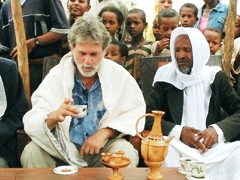
|
 If I am
up early on a Sunday morning, I enjoy listening to
Living on
Earth
, a radio program that tells an amazing array of
stories about the
environment and human connections. In October
2007, the show
featured
Dean
Cycon a
humanitarian, a
successful business
person, and a terrific story teller. His book Javetrekker
is required reading for students
in my coffee classes. In fact, every time I speak
with the owner of a
fair-trade coffee
shop, I suggest
that the book would make a great sale item for the
shop, because it
explains the need for fair trade better than
anything else I've read. If I am
up early on a Sunday morning, I enjoy listening to
Living on
Earth
, a radio program that tells an amazing array of
stories about the
environment and human connections. In October
2007, the show
featured
Dean
Cycon a
humanitarian, a
successful business
person, and a terrific story teller. His book Javetrekker
is required reading for students
in my coffee classes. In fact, every time I speak
with the owner of a
fair-trade coffee
shop, I suggest
that the book would make a great sale item for the
shop, because it
explains the need for fair trade better than
anything else I've read.
 Dean is
also
the
founder of Dean's
Beans --
a
Massachusetts-based roaster that is a pioneer in
fair
trade coffee and
a strong supporter of
public
libraries!
Not only is Dean
the model of respectful relationships
with the farmers, but he helps libraries --
including Bridgewater
Public -- to create private-label coffee
for fundraising. Dean is
also
the
founder of Dean's
Beans --
a
Massachusetts-based roaster that is a pioneer in
fair
trade coffee and
a strong supporter of
public
libraries!
Not only is Dean
the model of respectful relationships
with the farmers, but he helps libraries --
including Bridgewater
Public -- to create private-label coffee
for fundraising.
Check out Dean's YouTube
channel for stories that bring the viewer
directly to the farmers!
|
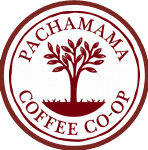
|
In Grounds
for
Agreement, his comprehensive analysis of the
coffee commodity
chain, sociologist John
Talbot describes the process of forward
integration:
Forward inegration is a
strategy of
extending one's control from a given point on
the commodity chain to
processing stages located further along the
chain, toward the final
consumption end.
To the extent
that
fair-trade cooperatives can capture such stages --
such as washing,
transporting, and drying -- they can increase the
share of profits that
accrue to the producers themselves. The Pachamama
Coffee Co-op
is a collaboration of coffee cooperatives in five
countries (including
one I have visited in Nicaragua) that pushes this
model farther than I
have seen elsewhere. In addition to the
transportation and processing
facilities that member cooperatives own in the
producing countries,
they have jointly invested in roasting and retail
capacity at the
consumer end in the United States, thus
controlling the entire supply
chain.
|

|
We are fortunate to live
in a region with so many leaders in the ethical
treatment of coffee
farmers and the coffeelands. This commitment
sometimes takes very
different forms. For example, Jim's
Organic Coffee in
Wareham emphasizes high quality and organic
growing, but does not
follow the cooperative-based, fair-trade model.
The web site
explains how the company sees this as working for
the benefit of
farming communities.
|
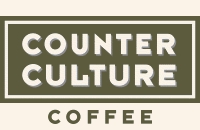
|
COFFEE DRIVEN PEOPLE --
PEOPLE
DRIVEN COFFEE
I learned about
Counter Culture Coffee from one of the farmers
we visited in
Matagalpa. I turn to this company
(or Java Vino - see below) when I am giving a major
presentation,
because I know that its "San
Ramon"
is a blend of coffees come from the immediate
vicinity of my
field-based
course. I can really taste the difference! Some of
the managers are
among
the foremost baristas in the United States, and they
have a strong
commitment
to quality and fairness in the entire supply chain,
from the field to
the
local coffee shop. In fact, they produced a video
of a barista competition that brought a tear to my
eye!
|

|
Sweet
Maria's is a California importer that
sells roasted coffee, but its real mission is to
provide roasters -- including individuals roasting
at home -- with a wide variety of coffees from
around the world, and sufficiently detailed
information to design blends. The company also
sells small-scale roasting equipment!
As with Counter Culture, Sweet Maria's provides
travel notes for every coffee source the company
visits. The notes are, however, much more detailed
than anything I've seen from any coffee company.
The company is also very careful about what it
will sell and for how long, considering even
unroasted coffee to be past its selling date after
six months. Even after the coffee is no longer for
sale, however, the tasting notes remain. In many
cases, return visits to the same source are
posted, so that the range of flavors and other
conditions can be understood.
Simply put, no other coffee site provides as much
geographic detail as Sweet Maria's.
|
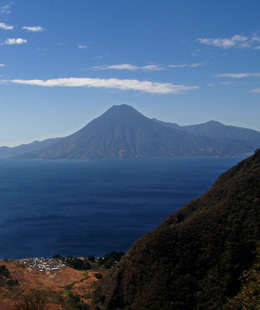
|
Until late 2007,
all I knew about
Guatemalan
coffee I learned from the
documentary
I mention above, which describes the struggle of
coffee growers during
and
following Guatemala's long civil war. Recently,
however, I have started
to
make a number of connections with Guatemala, and I
will be going there
for
some
research in the summer of 2008. When I go, I hope
to meet some of the
people in the region who have been working with
Green Mountain Coffee
Roasters.
Heifer
Hope
Blend, a
coffee from my
friends at Green Mountain that includes coffee
from
the
Cooperativa La Voz que Clama en el Desierto (The
Voice that Calls Out
in
the Desert Cooperative). The coffee is fair
trade, so the farmers
get
a fair price. It is organic, so the customer gets
a healthier cup and
the
soil in Guatemala is not contaminated. And it is a
Heifer partnership,
so
GMCR donates part of the proceeds to Heifer's
global projects to combat
hunger.
That is what people call win-win-win!
Green Mountain Coffee is an imporant roaster for
all of New England,
making good coffee available throughout the
region. Fair trade is not a
majority of its business, but it is an important
and growing part,
aided, oddly enough, by a large contract to
provide fair-trade, organic
coffee to McDonald's under the Newman's Own brand.
|
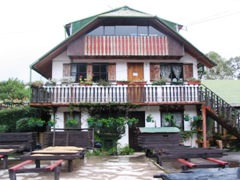
|
 During
my
first
visit to Matagalpa, we
had a
dinner at Selva
Negra, a hotel
in the middle of a coffee farm, and had a wonderful
conversation with
Mausi Kühl, one of the owners. Then I realized
that we kept
driving past Selva Negra on our way to other places.
The second year,
we spent a night there, and were able to see Mausi
again and her
husband Eddy, who has literally written the book on
the history of
coffee in Nicaragua. Both of the Kühls come
from German families
that were among the first to bring coffee to
Nicaragua. During both
visits, I learned about the sustainable practices of
the farm,
including renewable energy production and organic
food for the
restaurant and the farm employees. The children of
the farm employees
go to school and the farm makes college scholarships
available. During
my
first
visit to Matagalpa, we
had a
dinner at Selva
Negra, a hotel
in the middle of a coffee farm, and had a wonderful
conversation with
Mausi Kühl, one of the owners. Then I realized
that we kept
driving past Selva Negra on our way to other places.
The second year,
we spent a night there, and were able to see Mausi
again and her
husband Eddy, who has literally written the book on
the history of
coffee in Nicaragua. Both of the Kühls come
from German families
that were among the first to bring coffee to
Nicaragua. During both
visits, I learned about the sustainable practices of
the farm,
including renewable energy production and organic
food for the
restaurant and the farm employees. The children of
the farm employees
go to school and the farm makes college scholarships
available.
During our second visit I met the Kühl's
daughter Heddy, who sells
the coffee through her Java Vino shop in Atlanta.
The next time I am
visiting relatives in Atlanta, I will be there.
Meanwhile, I sometimes
order beans (green or roasted) from her to serve
when I am giving
lectures on coffee, so that my audience can have a
taste -- literally
-- of what we experienced in Matagalpa.
Coffee from an estate of this size with a single
owner cannot be
considered fair-trade.
|
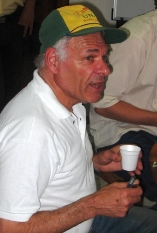
|
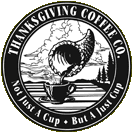 In
Mark Pendergrast's book, Uncommon
Grounds, an entire section is devoted to Paul
Katzeff, the founder
of Thanksgiving Coffee Company. Mark calls that
section "God's Gift to
Coffee." I had the great privilege of meeting Mr.
Katzeff during my
first trip to Nicaragua. We visited SolCafe,
a
worker-owned
processing plant in Matagalpa, where we were
scheduled
to observe a coffee cupping. It so happened that
Paul Katzeff and three
of his employees had just arrived as part of a
buying trip, so we
watched actual buyers doing the cupping to evaluate
potential purchases. In
Mark Pendergrast's book, Uncommon
Grounds, an entire section is devoted to Paul
Katzeff, the founder
of Thanksgiving Coffee Company. Mark calls that
section "God's Gift to
Coffee." I had the great privilege of meeting Mr.
Katzeff during my
first trip to Nicaragua. We visited SolCafe,
a
worker-owned
processing plant in Matagalpa, where we were
scheduled
to observe a coffee cupping. It so happened that
Paul Katzeff and three
of his employees had just arrived as part of a
buying trip, so we
watched actual buyers doing the cupping to evaluate
potential purchases.
Between slurps of coffee and comments about its
flavor and aroma, Mr.
Katzeff recounted his involvement in the efforts to
thwart the Reagan
Administration's illegal efforts to overthrow the
Nicaraguan
government, and how this related to the early days
of exporting
fair-trade coffee.
|
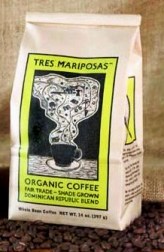
|
A great thing about my life these days is that
people - including my
wonderful wife -- bring me interesting coffees. A
great thing about the
coffee business in general is that it has room for
all kinds of
interesting coffee companies. When my wife and
daughter were traveling
in Vermont
recently, they found the
Tres
Mariposas (Three Butterflies) variety of Café
Alta
Gracia, a fair-trade, shade-grown
coffee from
the Dominican Republic. The coffee is grown at Finca
Alta Gracia, a
60-acre
farm in the Dominican Republic on the slopes of Pico
Duarte, the
highest (3087 meters) mountain in the Caribbean.
I like the connections being made with organic,
fair-trade, shade-grown
coffee. Vermont Coffee
Roasters in Middlebury roasts the coffee and nearby
Dakin Farms sells
it. A foundation in the Dominican Republic promotes
literacy, the brand
name celebrates the religious heritage of the
region, and the packaging
features the work of an important Dominican artist.
One of the owners,
author Julia Alvarez has written a delightful book,
A
Cafecito
Story. (Spanish and bilingual editions are
sometimes also
available.) She is also the author of the very
important work of
historic fiction, In
the
Time
of the Butterflies, which is the One
Book - One Community
read for fall 2010 in the town of Bridgewater, and a
film
starring Salma
Hayek. This book describes the brutality of the Trujillo
regime in the Dominican Republic, and along with the
Pulitzer-winning Brief Wondrous Life
of Oscar Wao,
it
is required reading for my geography of Latin
America students.
|

|
George
Howell
is
a coffee
pioneer known for his blends, his light roasts, and
his brewing
expertise. When he sold his Coffee Connection to
Starbucks, he had to
leave the business for a few years, but he is back
with Terroir
Coffee, in Acton,
Massachusetts. Now he focuses on single-origin
coffees, roasted and
prepared with care, and treated like fine wines
(hence the new name).
Corby Kummer has written "The
Magic
Brewing Machine" about Howell's introduction
of a new coffee
machine and his new company. "A
Magical Cup"
a
video
conversation between author and roaster.
|

|
Usually if I have nothing good
to say,
I say nothing at all. But the biggest coffee chain
in our region has
pushed me beyond politeness. Visit my Coffee
Hell page to learn why I think this
fast-growing and ubiquitous
company is not only bad for coffee farmers, but
also bad for the United
States.
|
Pamela
Hayes-Bohanan
has
a nice page about our small role in
coffee
marketing history,
in research conducted by a conventional company whose
coffee we can no
longer drink!
|
